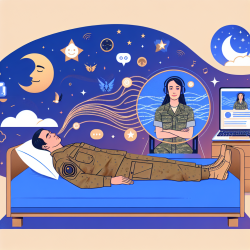Introduction
Chronic insomnia is a pervasive issue among military service members, significantly affecting their readiness, performance, and overall health. Traditional cognitive behavioral therapy for insomnia (CBTI) is the recommended treatment but often faces scalability challenges. The recent study, "Digital CBTI hubs as a treatment augmentation strategy in military clinics," explores how digital CBTI hubs can enhance the delivery and accessibility of insomnia care in military settings.
Understanding Digital CBTI Hubs
Digital CBTI hubs leverage technology to deliver asynchronous, remote insomnia treatment. These hubs are led by licensed clinicians using NOCTEM's COAST™ platform, which supports evidence-based clinical decision-making. The study compared traditional in-person care with digital CBTI hubs across three military sleep clinics, focusing on changes in insomnia severity, depression, anxiety, and patient satisfaction.
Key Findings and Implications
The study's findings suggest that digital CBTI hubs are non-inferior to traditional insomnia care, offering similar improvements in insomnia and daytime symptoms. This is a significant finding, as it demonstrates that digital hubs can effectively augment existing treatment capabilities without compromising quality.
- Scalability: Digital CBTI hubs can reach a broader geographic area, overcoming the limitations of in-person care and providing access to service members worldwide.
- Patient Engagement: The use of smartphones and digital platforms increases patient engagement and reduces the stigma associated with seeking behavioral health care.
- Cost-Effectiveness: By minimizing travel and coordination burdens, digital CBTI hubs can offer a more cost-effective solution for both patients and healthcare providers.
Practical Applications for Practitioners
For practitioners looking to improve their skills and treatment outcomes, integrating digital CBTI hubs into their practice could be a game-changer. Here are some steps to consider:
- Embrace Technology: Familiarize yourself with digital platforms like COAST™ to enhance your treatment offerings.
- Focus on Patient-Centered Care: Use digital tools to tailor treatment plans to individual patient needs, ensuring higher satisfaction and better outcomes.
- Stay Informed: Keep up with the latest research and developments in digital health technologies to continually improve your practice.
Conclusion
Digital CBTI hubs represent a promising advancement in the treatment of insomnia, particularly in military settings where accessibility and scalability are critical. By embracing these technologies, practitioners can offer more comprehensive and effective care, ultimately leading to better patient outcomes.
To read the original research paper, please follow this link: Digital CBTI hubs as a treatment augmentation strategy in military clinics: study protocol for a pragmatic randomized clinical trial.










